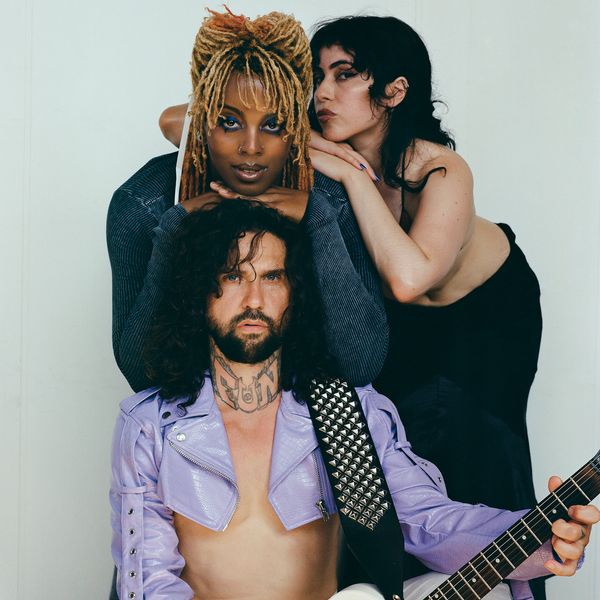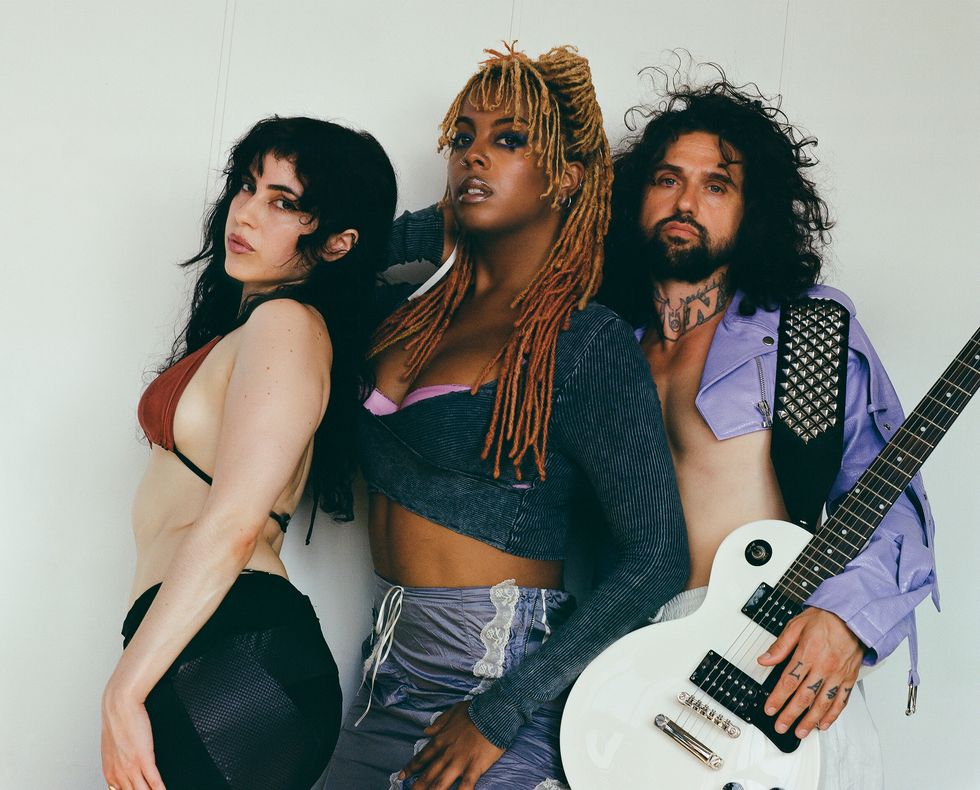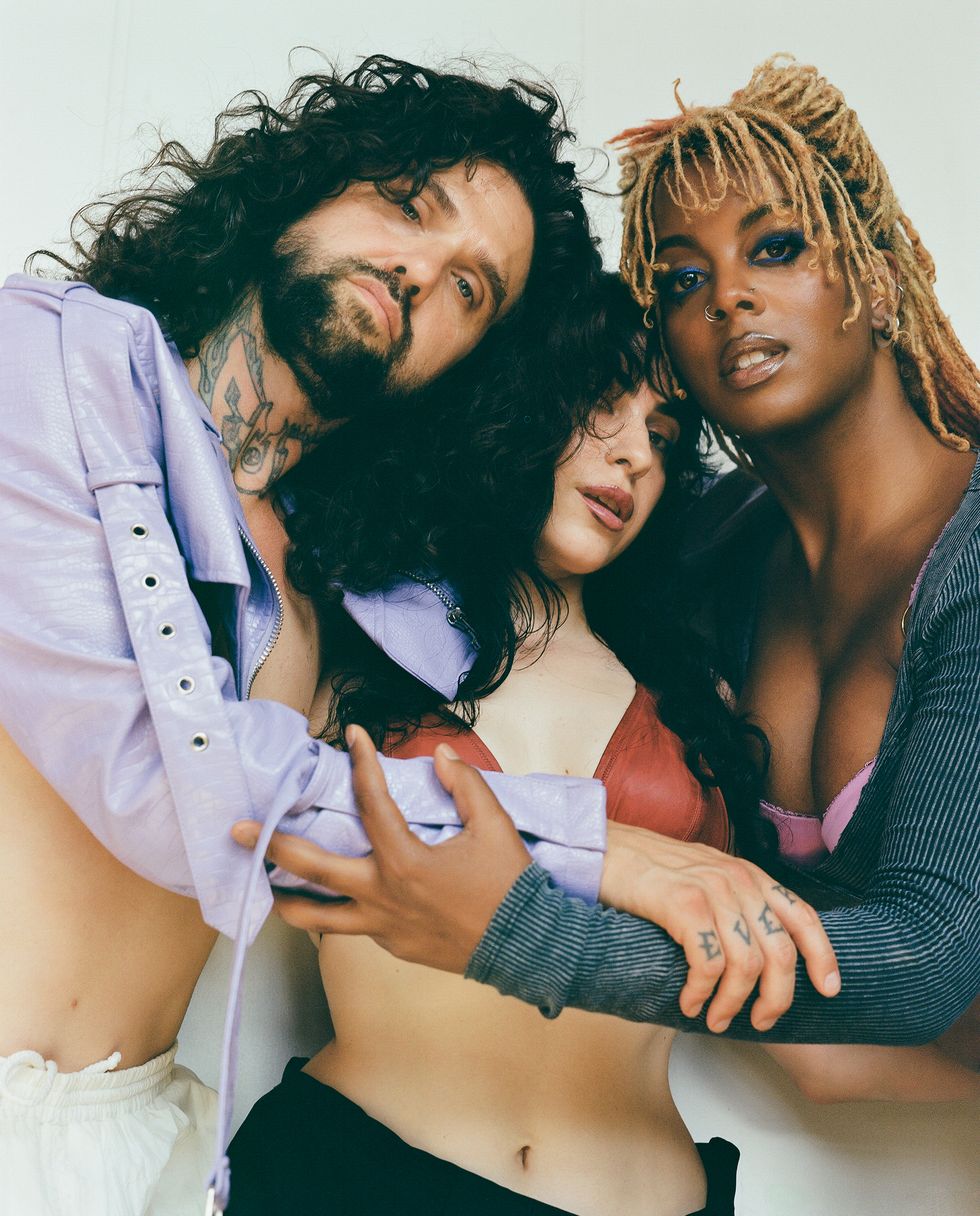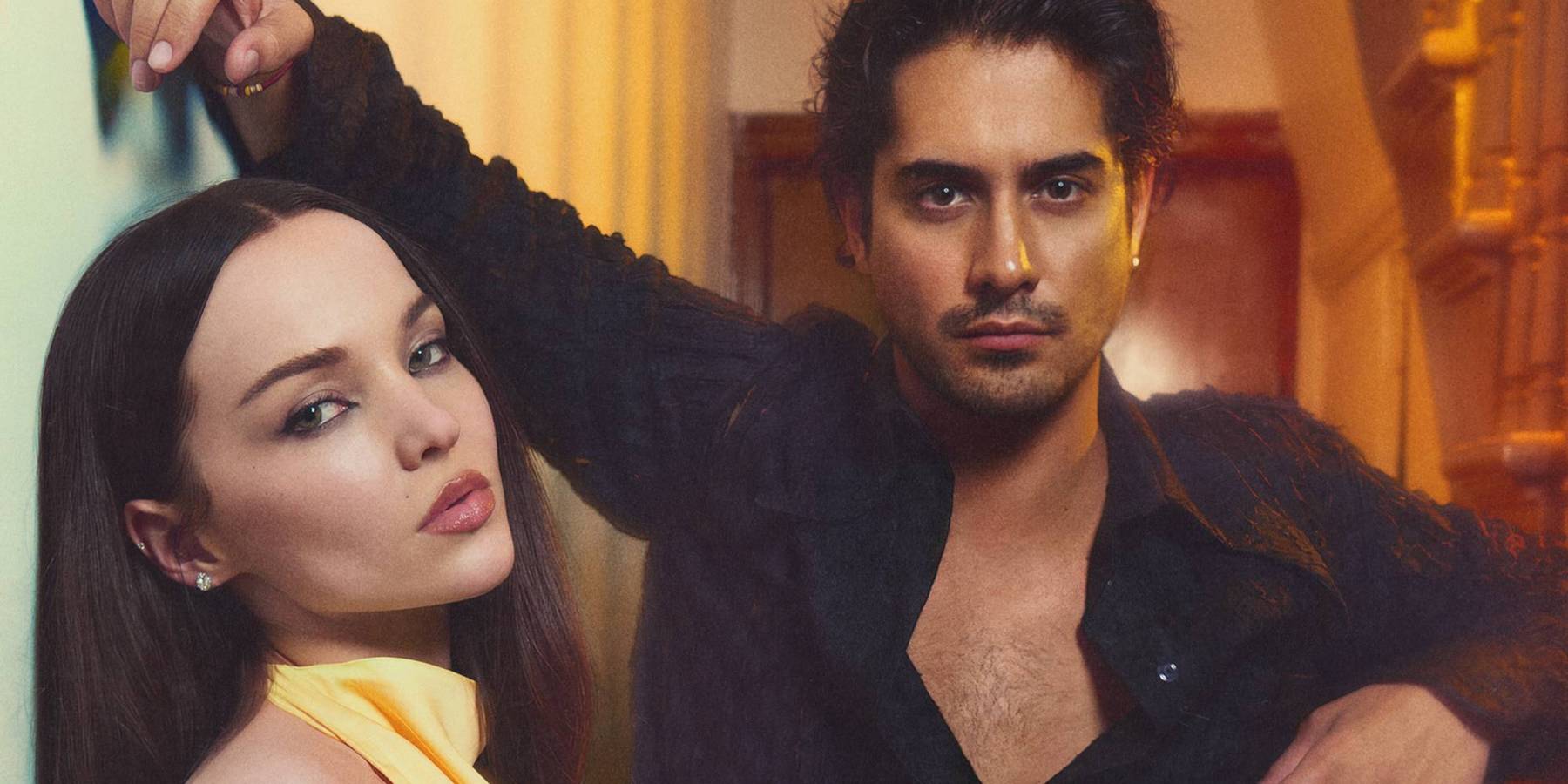
Tongue in the Mind Lick the Plate
By Tobias Hess
Aug 06, 2024“Pretty canary color of cherry/ In my garden blue/ Pretty canary named her carry after her screaming hues,” begins Juliana Huxtable with a lilting breathiness on “Pretty Canary,” the debut single from Tongue in the Mind, the glam-inflected art rock trio she fronts. The band — which comprises Huxtable, Jealous Orgasm (Joe Rinaldo Heffernan) and Via App (Dylan Shir) — has been developing for more than five years, and is the product of endless hours of play, conversation, and cross-continental recording sessions in Berlin, New York, London and Beirut.
Their music is marked by a thrilling theatricality. Over beds of distorted guitar, pounding electronics and expansive ambiance, Huxtable teeters between sung catharsis and circling poetics. On “Pretty Canary,” for example, what begins as an airy rumination, ends as something closer to energetic release as Huxtable sings of the proverbial canary anew. “It sat on my sill and snatched a pill I was sprinkling in my tea/ Then used its bill to swallow it steal/ Falling into its beak,” she wobbles, with “beak” fluttering up like the bird itself.
Huxtable, a globally revered DJ, writer and artist, has long deployed recordings of poetry in her sets, but in Tongue in the Mind, her writing takes on a new, vivid musicality. “Songwriting is so fun because it actually harkens back to a more old school idea of what poetry is,” Huxtable tells PAPER. “You're playing with rhyme, cadence and rhythm. It's not just something that exists on a page. It is synonymous with how it's vocalized.”
Indeed, the songs take on a mythic quality, with Huxtable speaking from both within the heat of the mosh pit and from a thousand feet high as she narrates the world like an all-seeing bard. With Rinaldo Heffernan’s distorted guitar providing the energetic motor and Shir’s intricate electronics holding the frame together, the trio’s music strikes a rare balance between boundless energy and laser focus.
PAPER chatted with Tongue in the Mind in the lead-up to their forthcoming August 9th show at MoMA PS1’s Warm Up to chat about the band’s lore, their deep collaboration and the long road to their forthcoming full-length album.

You both have been in collaboration for a while in various forms, but I’m curious how this iteration came about?
Juliana Huxtable: It started off in the context of performance art, which was great because there was a lot of room to play and experiment and collaborate. We've gone through so many different musical iterations. There was this performance we did at [performance festival] Performa. They asked me to do this performance that had video installation, but the musical element of it was key. [After the performance, someone] was just like, “Oh, wow! It sounds like a new version of Throbbing Gristle.” She was like, “Y'all are giving band.” People came up after the performance, and they were like, “The music is fully giving band.”
That performance was also great because it was super multimedia. And we traveled with that performance. Elysia Crampton was in that performance. Nitemind was doing lights. We started touring more produced performances, but it's really hard to travel with that scale. It was really hard to maintain with six to seven people [laughs]. It was insane. But then we did this performance [in Glasgow], another commission, and it was stripped back. And we worked with our friend who's a harpist. And that show really was banging. The music was always lit. But something about that performance was–
Joe Rinaldo Heffernan: Lush!
Juliana: Yeah, and then Joe and I at a certain point were like, “Let's just do the music thing.” The performance art is great, but we ended up playing music festivals anyway, because other people also saw the project and were like, “Wow, the music is really doing its own thing.” But there were no recordings of the performance [publicly available]. You couldn't download a song. And so at a certain point it was like, “Let's do the thing.”
Joe: That's what's wild about recording it now. It's been through so many iterations. It's really great to actually record everything, because we practice all the time.
When I first heard “Pretty Canary,” I was so excited by this art rock moment. What was your relationships to the genre prior?
Juliana: I think it's motivated by our natural interest and curiosities. Joe and I did this Residency in London at Somerset House. We had a really iconic studio and a really iconic recording space. That's when the songs just started to come together. None of us were together in lockdown. I was in Berlin and Beirut. Joe was in New York, and then Atlanta and China, in the very beginning. Like the very beginning of “Pretty Canary” started in my room in Berlin. We were going to start recording, but because of COVID it got delayed. So I started playing around in my room because I had all this gear. I made that initial two-note synth line, some percussion and then the very first verse. And then in London, I was with Joe. We had the guitar, bass and my full keyboard. We were both also making a lot of music individually in lockdown. It was so helpful just to play around, and I learned a lot more about what I can do with my voice.
Dylan Shir: Our respective palettes span widely over aesthetic and time, but we find a broad intersection together in harmonious ethics and attitudes. We all have a taste for the glam and the gothic. We meet especially at deathrock like Christian Death, and UK anarcho bitch punk like Rubella Ballet, Skeletal Family. And we all have roots in club music as well and get into varied strains of electro, jungle, etc that call upon a euphoric state with captivating rhythms.

You all have solo projects. And Juliana, I see you DJ all the time here in the city, which is a more solitary practice. What was engaging in a deep collaboration like this like?
Juliana: I've always liked collaborating with people. It was a little bit musical chairs when it was just Joe and I. I had the drum pad. I had a sampler. They had a keyboard. When Dylan came in, it really just expanded and streamlined the process. It's so fun.
Joe: Yeah, it really liberated everything to have the three of us, because we all just want to jam. And with collaborating, it's funny, because we all have our solo practice. There are things for me that I get to do in the band that I wouldn't normally do in solo practice, especially just playing guitar on top of Dylan’s beats. I grew up playing in bands, so this feels like a band.
Dylan: For me, it was very freeing in a way, to come to a collaboration that worked as well as this one, where we had similar goals and wanted to convey similar ideas with the music. In the past, I chose to play mostly solo because I have my very particular workflow and it could be daunting to let others into that or try to fit myself into someone else's flow. When Juliana, Joe and I came together, we bridged gaps in our individual systems and created new ones, and new languages even. For example, Joe and I fleshed out a way to bridge Joe's music theory system with my numbers-based system. The possibilities therein opened up a lot for me musically and I feel that sense of newness and revelation when I listen to the record. It was rewarding to fill in the gaps of each others' expertise toward a similar vision. I came to understand the rewards of relinquishing control and trusting in what we have together, which feels even greater than the sum of its parts.
I'm curious about the text itself. Juliana, you're a writer, and you’ve used poetry in your mixes for a while. Were you seeing this as an extension of that practice?
Juliana: Anything we do is going to be an expression of the worlds that we inhabit. So much of what I do comes from poetry. I've always made visual art and I always wanted to be an artist since I was a little kid, but for a long time that was not financially feasible. Writing is free. It's cheap. It's easy to disseminate. That’s where all of my initial ideas would come out. I obviously love poetry, but [Tongue in the Mind] is its own thing. There are moments of crossover, and the album will show the moments where I think the crossover is more clear. But to me songwriting is so fun because it actually harkens back to a more old school idea of what poetry is. Like metered verse where you're playing with rhyme, cadence and rhythm. It's not just something that exists on a page. It is synonymous with how it's vocalized. I love that about music. If you took song lyrics and just put that in a poetry book and tried to give that to poetry people, it wouldn't fly. Because it’s hard to do consistent rhyming at this point in a poetry context, and have it be taken seriously, which sometimes I think is a carry [laughs]. Songwriting is like old school poetry, actually, and I love that.
Joe: It’s for the people.
Is the text a collaborative process?
Juliana: It used to be that I would do the initial writing, and then we would play and talk and add some more lyrics. But it's become increasingly more collaborative. “Free Sex,” our last single, and “Piss Poor Taste,” both emerged out of the time that Joe and I were in London. I was in a really horrible breakup, and “Piss Poor Taste” was like a breakup song. And then “Free Sex” is the imagination of what's to come in terms of pleasure. We were listening to all this music, and just sharing ideas. I would then take the conversations, and go back and write. Joe came up with the initial riff musically. And then I came up with the second verse. I wrote the beginning of that to an iPhone video of the riff that Joe sent me. Then Dylan and I had a full brainstorming session where I was just like, “How would you describe sexual imagination?” We would just have this talking session. And so, even though I'm going back and actually formulating and synthesizing the lyrics, it's the product of volleying with each other.

Rock performance is such a specific cathartic experience. What's it been like taking this on the road?
Joe: We have a lot of moving parts. And we know what it's supposed to give. When it does that, it just feels great. It's always kind of a spiral with sound people and getting everything together. We're not a very traditional setup, and it's a very hybrid experience. So to have people get it doing sound, and then being able to be at the volume that we're now at. It feels great. I feel like MoMA PS1 will be great and I feel really good about the sound people there.
Juliana: I love playing. We just played Dripping [Festival in New Jersey]. We were outside in the forest. There was a technical thing where Joe and I’s monitors got switched. We were having a mini-technical crisis, but it was still so fab.
Joe: Yeah, I had Juliana’s mix in my ear. She had my mix, which was crazy. But Juliana was going off. Even though we couldn't hear anything, I was still like, “Wow, she's really hitting it tonight.”
Juliana: That comes from jamming so much. Even if something goes wrong, we can still lock in. We really love to jam and rehearse. So when we're ready to go, we're really ready to go. And it's nice playing in different contexts. My favorites are playing outside or in the club.
Juliana, is playing in the club a trippy experience, being so used to playing in clubs as a DJ?
Juliana: It's exciting to me. I love live music in the club. We also played at my party at Shock Value. That's my favorite combination. Live music should be in the club. I think [only having DJ’s in the club] is monetary, like really trying to maximize people or “live” meaning just one person with a really minimal kind of synth setup. So it’s lot of economic factors pushing live music out. Most of the time, if you're gonna go see a band, you have to go to a show that's probably gonna end by like midnight. And it's ticketed in a venue and someone's playing like a Spotify playlist before they go on. I like clubs, because clubs are alive. People are feeling in their bodies. People are really in their most activated states, musically. And I think that's the perfect setting for a band. Ideally, I don't want to play at like 8 PM. Like 9 PM on a Thursday... like what?
I'm excited that there's an album coming. Tell us about the forthcoming full-length album.
Juliana: It's like the full thing. At Dripping, I noticed a lot of people came up and were like, “Oh, my God! There's so many new songs. What's going on?” We were all like, “No, they're not new,” because to us they're not. But to most people they are. [On the album], you get the full range of what we give musically, which is pretty wide.
Joe: [A forthcoming song] “The Train” is gonna be a whole other deal. We have a pretty lengthy like... I don't even know what genre you would put it in. I guess it's like almost classical poetry with synth, but it's with piano and vocals. It’s 15-20 minutes long episodic Aria. We're gonna record that and put that on the album.
Dylan: I'm really excited for what's coming next. We are underway cooking up the album, and have touring plans I'm looking forward to. I feel we really have to be seen as a live act, as it has a life outside the recordings, so I'm excited for more of that, and for more collaborations.
Photos courtesy of Tyler Kai Jones
MORE ON PAPER
Entertainment
Dove Cameron and Avan Jogia Broke Their Molds
Photography by Gustavo Chams / Story by Joan Summers
Photography by Gustavo Chams / Story by Joan Summers
18 February
ATF Story
Madison Beer, Her Way
Photography by Davis Bates / Story by Alaska Riley
Photography by Davis Bates / Story by Alaska Riley
16 January
Entertainment
Cynthia Erivo in Full Bloom
Photography by David LaChapelle / Story by Joan Summers / Styling by Jason Bolden / Makeup by Joanna Simkim / Nails by Shea Osei
Photography by David LaChapelle / Story by Joan Summers / Styling by Jason Bolden / Makeup by Joanna Simkim / Nails by Shea Osei
01 December
Entertainment
Rami Malek Is Certifiably Unserious
Story by Joan Summers / Photography by Adam Powell
Story by Joan Summers / Photography by Adam Powell
14 November
Music
Janelle Monáe, HalloQueen
Story by Ivan Guzman / Photography by Pol Kurucz/ Styling by Alexandra Mandelkorn/ Hair by Nikki Nelms/ Makeup by Sasha Glasser/ Nails by Juan Alvear/ Set design by Krystall Schott
Story by Ivan Guzman / Photography by Pol Kurucz/ Styling by Alexandra Mandelkorn/ Hair by Nikki Nelms/ Makeup by Sasha Glasser/ Nails by Juan Alvear/ Set design by Krystall Schott
27 October




